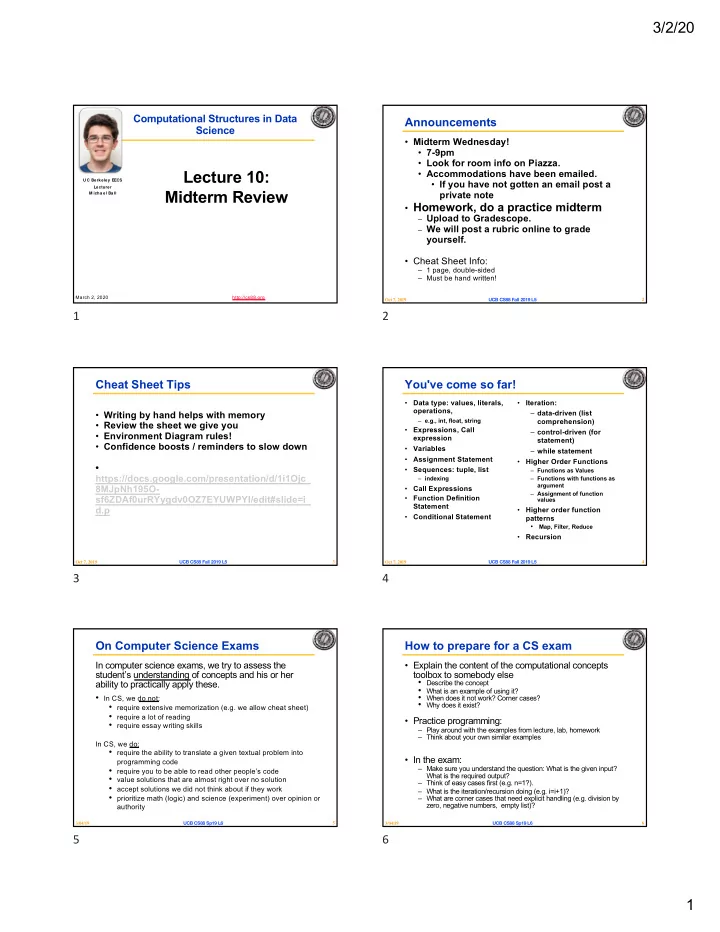

3/2/20 Computational Structures in Data Announcements Science • Midterm Wednesday! • 7-9pm • Look for room info on Piazza. Lecture 10: • Accommodations have been emailed. UC Berkeley EECS • If you have not gotten an email post a Lecturer Midterm Review private note M icha el Ba ll • Homework, do a practice midterm – Upload to Gradescope. – We will post a rubric online to grade yourself. • Cheat Sheet Info: – 1 page, double-sided – Must be hand written! March 2, 2020 http://cs88.org Oct 7, 2019 UCB CS88 Fall 2019 L5 2 1 2 Cheat Sheet Tips You've come so far! • Data type: values, literals, • Iteration: operations, – data-driven (list • Writing by hand helps with memory – e.g., int, float, string comprehension) • Review the sheet we give you • Expressions, Call – control-driven (for • Environment Diagram rules! expression statement) • Confidence boosts / reminders to slow down • Variables – while statement • Assignment Statement • Higher Order Functions • • Sequences: tuple, list – Functions as Values https://docs.google.com/presentation/d/1i1Ojc – indexing – Functions with functions as argument 8MJpNh195O- • Call Expressions – Assignment of function sf6ZDAf0urRYygdv0OZ7EYUWPYI/edit#slide=i • Function Definition values Statement d.p • Higher order function • Conditional Statement patterns • Map, Filter, Reduce • Recursion Oct 7, 2019 UCB CS88 Fall 2019 L5 3 Oct 7, 2019 UCB CS88 Fall 2019 L5 4 3 4 On Computer Science Exams How to prepare for a CS exam In computer science exams, we try to assess the • Explain the content of the computational concepts student’s understanding of concepts and his or her toolbox to somebody else • Describe the concept ability to practically apply these. • What is an example of using it? • In CS, we do not: • When does it not work? Corner cases? • Why does it exist? • require extensive memorization (e.g. we allow cheat sheet) • require a lot of reading • Practice programming: • require essay writing skills – Play around with the examples from lecture, lab, homework – Think about your own similar examples In CS, we do: • require the ability to translate a given textual problem into • In the exam: programming code • require you to be able to read other people’s code – Make sure you understand the question: What is the given input? What is the required output? • value solutions that are almost right over no solution – Think of easy cases first (e.g. n=1?). • accept solutions we did not think about if they work – What is the iteration/recursion doing (e.g. i=i+1)? • prioritize math (logic) and science (experiment) over opinion or – What are corner cases that need explicit handling (e.g. division by zero, negative numbers, empty list)? authority 3/04/19 UCB CS88 Sp19 L6 5 3/04/19 UCB CS88 Sp19 L6 6 5 6 1
3/2/20 Function Review Review Higher Order Functions (cont) • A function that returns (makes) a function • A function cannot… def leq_maker(c): A) have a function as argument def leq(val): B) define a function within itself return val <= c C) return a function return leq D) call itself E) None of the above. >>> leq_maker(3) <function leq_maker.<locals>.leq at 0x1019d8c80> >>> leq_maker(3)(4) False >>> filter(leq_maker(3), [0,1,2,3,4,5,6,7]) Solution: [0, 1, 2, 3] E) A, B, C, D are all possible! >>> Oct 7, 2019 UCB CS88 Fall 2019 L5 7 3/3/20 UCB CS88 Sp20 L10 8 7 8 WWPD Review: One more example • What does this function do? def split_fun(p, s): ””” Returns <you fill this in>.""" return [i for i in s if p(i)], [i for i def split_fun(p, s): in s if not p(i)] ””” Returns <you fill this in>.""" return [i for i in s if p(i)], [i for i in s if not p(i)] >>> split_fun(leq_maker(3), [1,2,3,4,5,6]) >>> split_fun(leq_maker(3), [0,1,2,3,4,5,6] A) ([1, 2, 3, 4, 5, 6], [1, 2, 3, 4, 5, 6]) B) ([], [1, 2, 3, 4, 5, 6]) C) ([1, 2], [3, 4, 5, 6]) D) ([1, 2, 3], [4, 5, 6]) E) Error Solution: D Oct 7, 2019 UCB CS88 Fall 2019 L5 9 3/3/20 UCB CS88 Sp20 L10 10 9 10 A Minor Tool: Slicing WWPD def hofun(fun, seq): • This practice exam uses "slicing" return [fun(seq, s) for s in seq] • s[start:stop:step] • A common Python tool for lists / tuples / strings • s[0] is the first item def f(s, i): • s[0:length-1] is everything (a copy of the list) return s[0]+i • s[1:] – a default ending value, all but the first item • "hello"[1:] à "ello" hofun(f, [1, 3, 2]) A) [2, 4, 3] B) [1, 3, 2] C) [2, 6, 9] D) [11, 33, 22] E) Error Solution: A UCB CS88 Fall 2019 L5 3/3/20 UCB CS88 Sp20 L10 11 Oct 7, 2019 12 11 12 2
3/2/20 WWPD Lambdas x=2 y=3 >>> def inc_maker(i): z = "hello" ... return lambda x:x+i ... >>> inc_maker(3) def fooz(x): <function inc_maker.<locals>.<lambda> at 0x10073c510> x = x*x >>> inc_maker(3)(4) return x + y, x 7 a,b = fooz(y) >>> map(lambda x:x*x, [1,2,3,4]) <map object at 0x1020950b8> a >>> list(map(lambda x:x*x, [1,2,3,4])) A) 3 [1, 4, 9, 16] B) 6 >>> C) 9 D) 12 E) Error Solution: D UCB CS88 Fall 2019 L5 Oct 7, 2019 13 2/22/16 UCB CS88 Sp16 L4 14 13 14 Recursion Recursion • Base Case • What is the simplest form of the problem? def factorial(n): • if n == 0: Recursive Case • return 1 Divide: Break the problem down else: • Invoke: You need a recursive call!! return n * factorial(n – 1) • Combine: How does this work towards the final result? 2/22/16 UCB CS88 Sp16 L4 15 2/22/16 UCB CS88 Sp16 L4 16 15 16 3
Recommend
More recommend